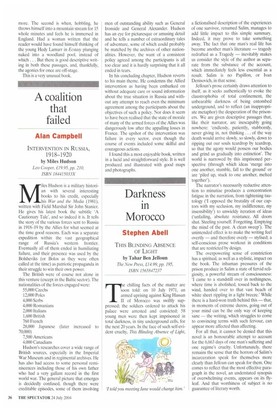Darkness in Morocco
Stephen Abell
THIS BLINDING ABSENCE OF LIGHT by Tahar Ben Jelloun The New Press, £14.99, pp. 195, ISBN 156584723 7 TIie chilling facts of the matter are soon told: on 10 July 1971, an armed uprising against King Hassan I of Morocco was swiftly suppressed; the soldiers ordered to attack his palace were arrested and convicted; 58 young men were then kept imprisoned in total darkness, in tiny underground cells, for the next 20 years. In the face of such self-evident cruelty, This Blinding Absence of Light, a fictionalised description of the experiences of one survivor, renamed Salim, manages to add little impact to this simple summary. Indeed, it may prove to take something away. The fact that one man's real life has become another man's literature — tragedy redrafted as a Tragedy — inevitably makes us consider the style of the author as separate from the substance of the account, which immediately feels less essential as a result. Salim is no Papillon, or Ivan Denisovich, in that sense. Jelloun's prose certainly draws attention to itself, as it seeks authentically to evoke the claustrophobia of total confinement, the unbearable darkness of being entombed underground, and to reflect (an inappropriate metaphor) the desperation of the prisoners. We are given descriptive passages that, like their narrator, are inescapably going nowhere: 'endlessly, patiently, stubbornly, never giving in, not thinking. . . of the way death would arrive slowly, so slowly, down to ripping out our souls teardrop by teardrop, so that the agony would possess our bodies and grind us gradually into extinction'. The world is narrowed by this imprisoned perspective (through which ideas 'merge into one another, stumble, fall to the ground' or are 'piled up, stuck to one another, melted together.).
The narrator's necessarily reductive attention to minutiae produces a concentration fatigue in the narration, from tightening tautology CI opposed the brutality of our captors with my seclusion, my indifference, my insensibility') to unwieldy iteration of ideas ('unfailing, absolute resistance. All doors shut. Steeling yourself. Forgetting. Emptying the mind of the past. A clean sweep'). The unintended effect is to make the writing feel overtly — and therefore overly — stylised; a self-conscious prose workout in conditions that are restricted by design.
The overpowering sense of constriction has a spiritual, as well as a stylistic, impact on the book. The inhuman pressures of the prison produce in Salim a state of fervid religiosity, a powerful stream of consciousness: 'I came to a standstill over in nothingness, where time is abolished, tossed back to the wind, handed over to that vast beach of white sheet rippling in a light breeze.' While there is a hard-won truth behind this — that, in moments of extreme duress, going out of your mind can be the only way of keeping sane the writing, which struggles to come to convincing terms with such fervour, can appear more affected than affecting.
For all that, it cannot be denied that this novel is an honourable attempt to account for the 6,663 days of one man's suffering and one regime's cruelty. Unfortunately, there remains the sense that the horrors of Salim's incarceration speak for themselves more clearly than Jelloun can speak for them. One comes to reflect that the most effective paragraph in the novel, an understated synopsis of overwhelming events, appears on its flyleaf. And that worthiness of subject is no guarantee of literary worth.


























































 Previous page
Previous page